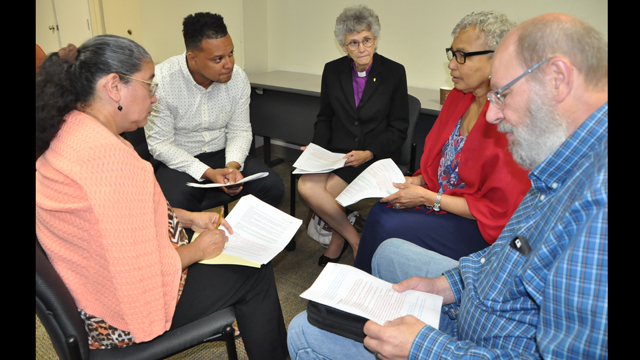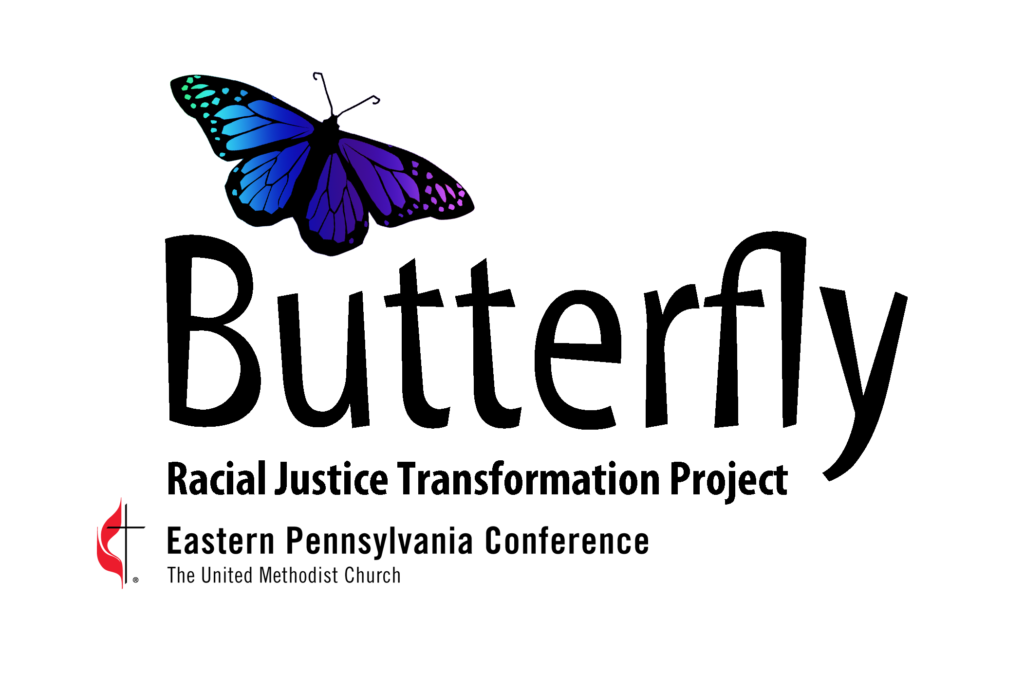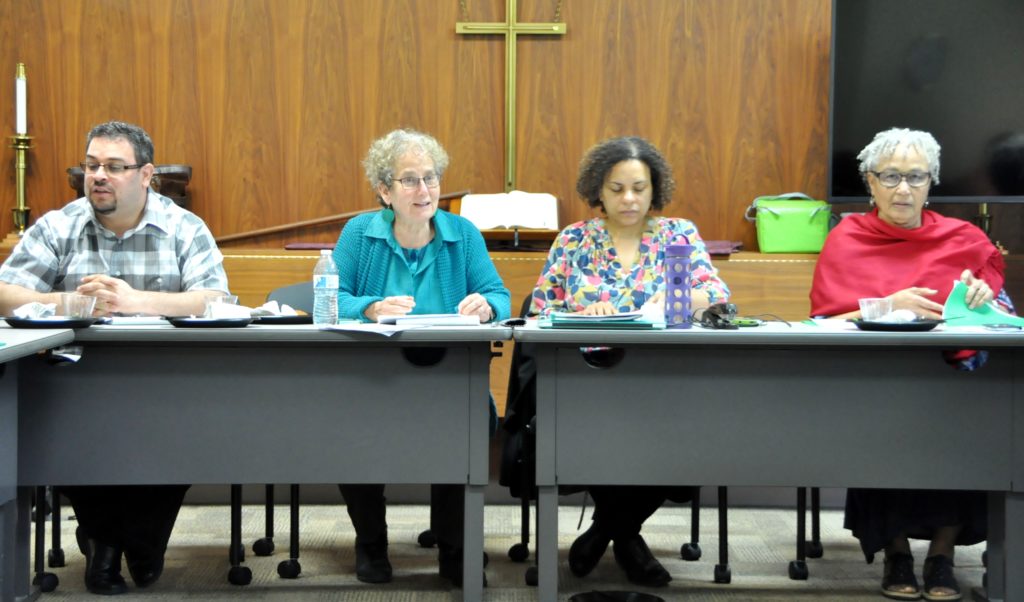
Leaders to address racial-ethnic groups’ claims of institutional racism
By John W. Coleman
Eastern PA Conference lead decision-makers met May 21 to hear frank, revealing criticism about observed and experienced institutional racism expressed in dialogue by three groups of racial-ethnic conference members and in a written report from the Committee on Native American Ministries (CONAM). They will hear more and try to seek solutions June 9 in a lengthy dialogue and planning session with representative members of those groups.
It is another of many steps in this potentially history-making quest to dismantle racism in the conference’s policies, practices and propensities. What follows will be creation and implementation of a strategic plan, led by the conference’s Connectional Ministries Office and Commission on Religion and Race and assisted by leaders of Black Methodists for Church Renewal and the General Commission on Religion and Race (GCORR).
 The name “Butterfly Project,” shorthand for the conference’s new Racial Justice Transformation Project, refers to eventual but real change in form and function; and that is the goal of conference and church leaders who have invested much time, treasure and truth in this endeavor.
The name “Butterfly Project,” shorthand for the conference’s new Racial Justice Transformation Project, refers to eventual but real change in form and function; and that is the goal of conference and church leaders who have invested much time, treasure and truth in this endeavor.
The project is an effort to fulfill the Call to Action resolution, endorsed by delegates and bishops at the 2016 Northeastern Jurisdictional Conference, that calls on each annual conference to make “efforts to address, confront, and otherwise demand systemic fundamental and institutional change both within the church and the world…”
The Eastern PA and Peninsula-Delaware conferences co-employed organizational consultants Dragonfly Partners to conduct structural, or institutional, racism assessments with each conference separately, using candid, in-depth discussions with groups of racial-ethnic members and key conference leaders. The two conferences are sharing the considerable cost of the consulting service to make it affordable.
Eastern PA’s racial-ethnic group members—Latino, Asian-American (Korean and Indian Americans) and people of African descent (including African and Caribbean Americans)—gathered April 28 and May 5 for separate, confidential conversations guided by Dragonfly Partners. CONAM members also submitted a requested letter.
The guided dialogues covered current as well as historical, institutional policies, practices and behaviors that may have present-day ramifications for some, including perceived mistreatment of racial-ethnic clergy and churches. Conference staff and Cabinet members did not attend the groups’ discussions, which were each limited to about 20 people to optimize participation.
However, consultants Amadee Braxton and Sara Joffe shared an overview and “common themes” and “ideas for change” with a roomful of conference leaders in decision-making roles, from Bishop Peggy Johnson, Cabinet members and executive staff, to chairs of key ministry boards and committees. In summary, they described the racial-ethnic groups’ discussions as “deeply felt from experience” and described participants as “animated and extremely engaged.”
Commonly held views shared included concerns about:
- A power imbalance between large, wealthy predominantly white churches versus small, under-resourced racial-ethnic minority churches, leading to white privilege and racial inequities in conference attention, expectations, resources, leadership representation and deference in appointing pastors.
- Expected assimilation that requires people and churches of color to “fit into the white way” of doing ministry, resulting in detrimental prejudice against those who do not.
- Racial-ethnic groups being “pitted against each other” in competition for conference attention and funding for ministry.
- Lack of respect, inclusion and language interpretation in conference meetings and media for members whose first language is not English, thus discouraging their participation. Also, failure by many to see cultural differences as an asset from which others can benefit.
- Historic, debilitating injustice decades ago that required some black churches to merge with and occupy large, burdensome buildings of declining white urban churches, whose members were leaving Philadelphia’s inner city for its suburbs.
Braxton and Joffe reported that some participants “had waited a long time to share their views but would not have shared them directly with leadership,” for fear of retaliation. And they reported hearing “a huge amount of skepticism that anything would really change.” None of the comments from the groups were attributed to individuals.
Conference leaders analyzed the various criticisms in small groups and shared their feedback, which included surprise for some but not for others and concern that real, perceivable changes must happen to honor the intention and integrity of the project.
“While the Call to Action may be the impetus for this initiative, we want to expand our assessment of racism that may affect all racial-ethnic clergy, laity and congregations in our conference,” said the Rev. Anita Powell, Executive Director of Connectional Ministries. “We’re taking on the challenge to examine conference structure, systems and behaviors that have long affected people in different ways. So, we want candid viewpoints that can get to the heart of these concerns, in order to forge systemic change and attempt reconciliation.”
Following the final, June 9 dialogue, the Dragonfly consultants will prepare a report during the summer, with strategic recommendations from its study. The Butterfly Project’s managers will seek to implement the recommendations beginning in the fall, aided by the Rev. Giovanni Arroyo of GCORR, who has consulted with the conference and taught Cross-Racial/Cross-Cultural Ministry workshops here in the past. Arroyo credits Eastern PA and Peninsula-Delaware with being the only conferences he knows of across the denomination to undertake institutional racism assessments.
“This conference’s vision is to be ‘United in Christ, Committed to Transformation’” said Bishop Peggy Johnson, leader of both conferences in the Philadelphia Episcopal Area. “We know that vision requires righting wrongs, healing wounds and establishing a foundation of trust. There may be some anger that surfaces, but if it leads to wisdom, healing and reconciliation, if it leads to repairing the breach, then it will have been worth the struggle.”

